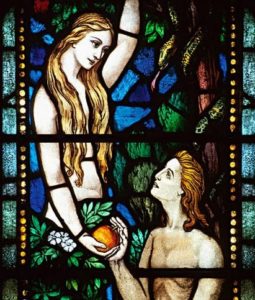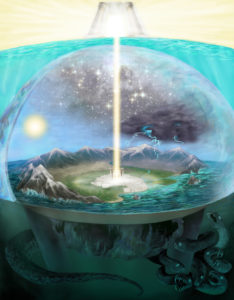Back when I was first learning Christian Apologetics, I would download free MP3 audio files to my MP3 player from Apologetics315.com which is the website run by Brian Auten. I listened to a bunch of lectures from several different apologists on several different subjects. One of these was about evolution by Dr. Phil Fernandes; the president of the Institute Of Biblical Defense. In the lecture, he gave arguments against evolution, both biblical and scientific. Of the biblical arguments, he gave one which appealed to 1 Corinthians 15:39. This scripture says “All flesh is not the same flesh, but there is one kind of flesh of men, another flesh of animals, another of fish, and another of birds.” (NKJV).
From this verse, Fernandes concluded that God could not possibly have used evolution to produce the various kinds of different life forms that exist on our planet. Why? Because according to evolution, all living creatures — animals, humans, and even plants — have descended from a single celled organism billions of years ago. This is what scientists call “The universal common ancestor”. The universal common ancestor is at the base of the tree of life. According to biologists, this is why all living things have the same genetic code. Now, Fernandes argued that if all things are biologically related, then this scripture is stating something that is untrue. Therefore, The Bible and evolution are incompatible, and Theistic Evolution is therefore untenable.
For the longest time, I thought this was a pretty good theological objection to Theistic Evolution. However, I no longer believe this. For one thing, the Apostle Paul’s emphasis in this passage on the differences between various different kinds of creatures, because the context of the verse is him explaining the difference between the physical body that we have now with the body that we will receive at the resurrection, upon Christ’s return. In verse 39, he talks about the different kinds of bodies that the various different kinds of animals have, then in verses 40 and 41, he talks about the different luminosity or glory that the stars have from one another. Then Paul says “So also is the resurrection of the dead. The body is sown in corruption, it is raised in incorruption. It is sown in dishonor, it is raised in glory. It is sown in weakness, it is raised in power. It is sown a natural body, it is raised a spiritual body. There is a natural body, and there is a spiritual body. And so it is written, The first man Adam became a living being.’ The last Adam became a life-giving spirit.” (verses 42-45). So, Paul’s reason for mentioning the differences between the animals, and the differences between the different kinds of stars, is because he using these as analogies. He’s essentially saying “Just as the body of a bear and a man are very different, so also our resurrection body will be very different than the body we have now. And just as every star is different, so also our resurrection body will be different from the body we have now.”
So, I don’t think Paul is trying to give a lesson in biology here. Rather, he’s simply using observational language in order to make a theological point. Observational language is found in many parts in scripture. For example, when The Bible says “He set the earth on its foundations; it can never be moved.” (Psalm 104:5), no one interprets that as saying that the Earth doesn’t rotate or revolve around the sun. Or when scripture talks about the “rising” and “setting” of the sun — language which we English speakers even use today –, we don’t think The Bible is saying that the sun is moving around the Earth, literally moving upwards during the day and moving downwards at night. These are simply ways of describing phenomena as they appear to the naked eye. I think that Paul is doing the same thing in this passage. He is not saying that all flesh is biologically unrelated, but they certainly appear that way to us, and so it would be natural to say that they’re different fleshes. And the appearance of being different is all that’s needed for Paul’s illustration to work.
Now, does this put The Bible in error? Not at all! As I noted above, we use observational language even today. Yet no one would accuse a weather report of being in error if the meteorologist said things like “…when the sun rises…” or “when the sun sets”. Neither do we accuse each other of scientific inaccuracies when someone says “I’ll do such and such when the sun comes up” or “We better hurry and get this thing done before the sun goes down”. In these cases, we realize that the people saying such things are not trying to give astronomically correct descriptions of the way these celestial bodies work, but they’re simply describing phenomena as they appear to the naked eye. It makes sense to do this since often times astronomically correct phrasing will make your sentences overly verbose. “We better hurry and get this thing done before the Earth’s rotation causes the sun to shine on the other side of the planet instead of on our side!” for example. In conclusion: this is not a good proof text against Theistic Evolution.
Discover more from Cerebral Faith
Subscribe to get the latest posts sent to your email.




